Related Research Articles
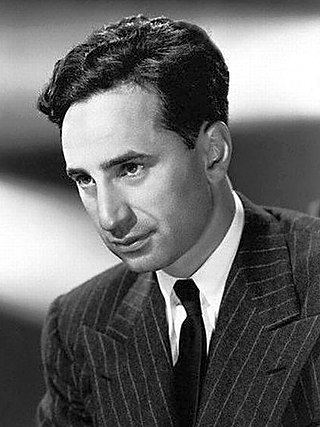
Elias Kazantzoglou, known as Elia Kazan, was an American film and theatre director, producer, screenwriter and actor, described by The New York Times as "one of the most honored and influential directors in Broadway and Hollywood history".

Clifford Odets was an American playwright, screenwriter, and actor. In the mid-1930s, he was widely seen as the potential successor to Nobel Prize–winning playwright Eugene O'Neill, as O'Neill began to withdraw from Broadway's commercial pressures and increasing critical backlash. From January 1935, Odets's socially relevant dramas were extremely influential, particularly for the remainder of the Great Depression. His works inspired the next several generations of playwrights, including Arthur Miller, Paddy Chayefsky, Neil Simon, and David Mamet. After the production of his play Clash by Night in the 1941–42 season, Odets focused his energies primarily on film projects, remaining in Hollywood until mid-1948. He returned to New York for five and a half years, during which time he produced three more Broadway plays, only one of which was a success. His prominence was eventually eclipsed by Miller, Tennessee Williams, and, in the early- to mid-1950s, William Inge.

The Group Theatre was a theater collective based in New York City and formed in 1931 by Harold Clurman, Cheryl Crawford and Lee Strasberg. It was intended as a base for the kind of theatre they and their colleagues believed in—a forceful, naturalistic and highly disciplined artistry. They were pioneers of what would become an "American acting technique", derived from the teachings of Konstantin Stanislavski, but pushed beyond them as well. The company included actors, directors, playwrights, and producers. The name "Group" came from the idea of the actors as a pure ensemble; a reference to the company as "our group" led them to "accept the inevitable and call their company The Group Theatre."
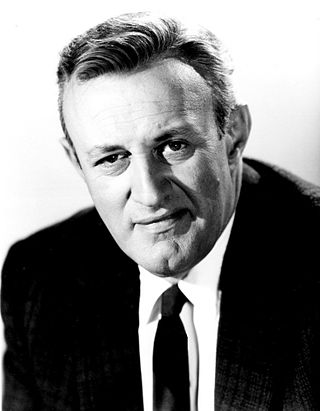
Lee J. Cobb was an American actor, known both for film roles and his work on the Broadway stage, as well as for his television role in the series, The Virginian. He often played arrogant, intimidating and abrasive characters, but he also acted as respectable figures such as judges and police officers. Cobb originated the role of Willy Loman in Arthur Miller's 1949 play Death of a Salesman under the direction of Elia Kazan, and was twice nominated for the Academy Award for Best Supporting Actor, for On the Waterfront (1954) and The Brothers Karamazov (1958).
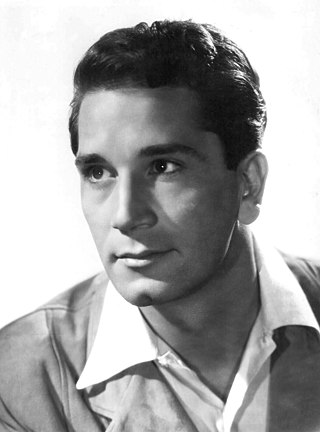
Nicholas Peter Conte, known professionally as Richard Conte, was an American actor. He appeared in more than 100 films from 1939 through the 1970s, including I'll Cry Tomorrow, Ocean's 11, and The Godfather.
Waiting for Lefty is a 1935 play by the American playwright Clifford Odets; it was his first play to be produced. Consisting of a series of related vignettes, the entire play is framed by a meeting of cab drivers who are planning a labor strike. The framing uses the audience as part of the meeting.
Golden Boy is a drama by Clifford Odets. The play was initially produced on Broadway by The Group Theatre in 1937. Odets' biggest hit was made into a 1939 film of the same name, starring William Holden in his breakthrough role, and also served as the basis for a 1964 musical with Sammy Davis Jr.

Harold Edgar Clurman was an American theatre director and drama critic. In 2003, he was named one of the most influential figures in U.S. theater by PBS. He was one of the three founders of New York City's Group Theatre (1931–1941). He directed more than 40 plays in his career and, during the 1950s, was nominated for a Tony Award as director for several productions. In addition to his directing career, he was drama critic for The New Republic (1948–1952) and The Nation (1953–1980), helping shape American theater by writing about it. Clurman wrote seven books about the theatre, including his memoir The Fervent Years: The Group Theatre and the Thirties (1961).

The Time of Your Life is a 1939 five-act play by American playwright William Saroyan. The play is the first drama to win both the Pulitzer Prize for Drama and the New York Drama Critics Circle Award. The play opened on Broadway in 1939.
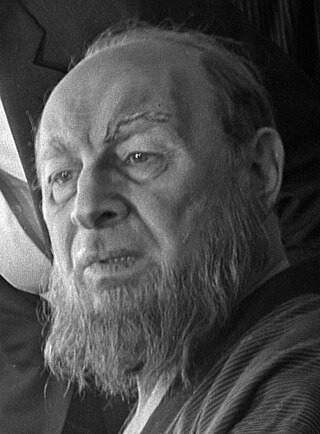
Morris Carnovsky was an American stage and film actor. He was one of the founders of the Group Theatre (1931-1940) in New York City and had a thriving acting career both on Broadway and in films until, in the early 1950s, professional colleagues told the House Un-American Activities Committee that Carnovsky had been a Communist Party member. He was blacklisted and worked less frequently for a few years, but then re-established his acting career, taking on many Shakespearean roles at the Stratford Shakespeare Festival and performing the title roles in college campus productions of King Lear and The Merchant of Venice. Carnovsky's nephew is veteran character actor and longtime "Pathmark Guy" James Karen.
Phoebe Brand was an American actress.
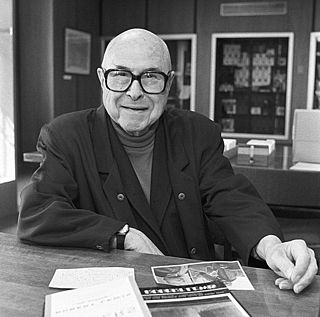
Robert Lewis was an American actor, director, teacher, author and founder of the influential Actors Studio in New York in 1947.

Awake and Sing! is a drama play written by American playwright Clifford Odets. The play was initially produced by The Group Theatre in 1935.

Thomas G. Waites is an American actor and acting instructor born in Philadelphia, Pennsylvania. Waites runs an eponymous acting studio in New York City. He has been a member of the Actors Studio since 1984.
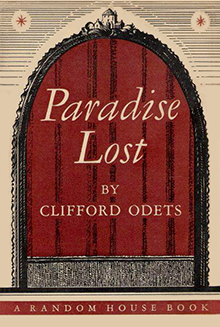
Paradise Lost is a drama by Clifford Odets that takes place in 1932, during the Depression. The play was originally produced on Broadway by the Group Theatre in 1935. It was also filmed for television broadcast in 1971.

Clash by Night is a romantic triangle drama by Clifford Odets which premiered on Broadway in 1941 and was later adapted to film and television. The title derives from Matthew Arnold's poem "Dover Beach" (1867):

Roman Aloys Bohnen was an American actor. He is perhaps best known for his roles in the films Of Mice and Men (1939), The Song of Bernadette (1943), and The Best Years of Our Lives (1946).
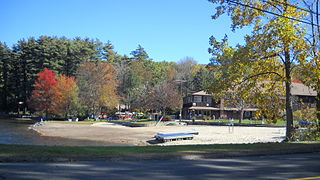
Pine Brook Country Club is a private lake association in Nichols, Connecticut, a village within the Town of Trumbull. It began when Benjamin Plotkin purchased Pinewood Lake and the surrounding countryside on Mischa Hill. Plotkin built an auditorium with a revolving stage and forty rustic cabins and incorporated as the Pine Brook Country Club in 1930. Plotkin's dream was to market the rural lakeside club as a summer resort for people to stay and enjoy theatrical productions. The Club remained in existence until productions were disrupted by World War II, and was reorganized as a private lake association in 1944.

Ruth Gloria Nelson was an American stage and film actress. She is known for her roles in films such as Wilson, A Tree Grows in Brooklyn, Humoresque, 3 Women, The Late Show and Awakenings. She was the wife of John Cromwell, with whom she acted on multiple occasions.
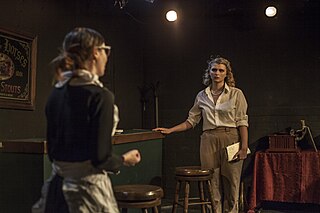
The Big Knife is an American play by Clifford Odets. The original production was directed by Lee Strasberg, who had worked with Odets at the Group Theatre, and starring fellow Group Theatre alumnus John Garfield. The play debuted at Broadway's National Theatre on 24 February 1949 before closing on May 28 after 109 performances. The Big Knife marked the return of Odets to Broadway after a six-year hiatus in which he toiled in Hollywood as a screenwriter and motion picture director. The play concerns the disillusionment of a movie star with the Hollywood's studio system and disgust with himself, as he has lost his idealism in the pursuit of success.
References
- 1 2 "Stage Left: The Struggles of Clifford Odets". The New Yorker. April 17, 2006. Retrieved October 3, 2015.
- ↑ Cantor, Harold (2000). Clifford Odets, Playwright-poet. Scarecrow Press. p. 98. ISBN 0810837323.
- 1 2 "Night Music – Broadway Play – Original". www.ibdb.com. The Broadway League. Retrieved September 6, 2017.
- ↑ Hayes, Richard (2009). "Clifford Odets and the Movies" (PDF). Revista de Estudios Norteamericanos (14): 67–80. Retrieved October 3, 2015.
- ↑ Brenman-Gibson, Margaret (2002). Clifford Odets: American Playwright : the Years from 1906 to 1940. Hal Leonard Corporation. p. 616. ISBN 1557834571.
- 1 2 3 4 Smith, Wendy (1990). Real life drama : the Group Theatre and America, 1931-1940 (1st ed.). New York: Knopf. pp. 394-400. ISBN 0394574451.
- ↑ Mantle, Burns (February 23, 1940). ""Night Music," Two On an Island, According to Odets". Daily News. p. 304. Retrieved November 28, 2019– via Newspapers.com.
- 1 2 Kendall, Elaine (September 1, 1988). "Clifford Odets: A Year in a Gifted Life". The Los Angeles Times. p. 190. Retrieved November 28, 2019– via Newspapers.com.
- ↑ Watts Jr., Richard (March 3, 1940). "Saroyan's Influence Seen in Odets' Play". The Pittsburgh Press. p. 19. Retrieved November 28, 2019– via Newspapers.com.
- ↑ Atkinson, Brooks (February 23, 1940). "THE PLAY; Group Theatre Produces Clifford Odets's 'Night Music,' or Boy Meets Girl in Gotham". The New York Times. ISSN 0362-4331 . Retrieved November 28, 2019.